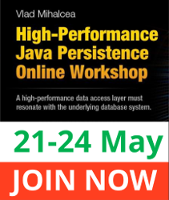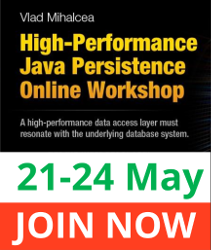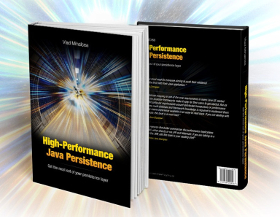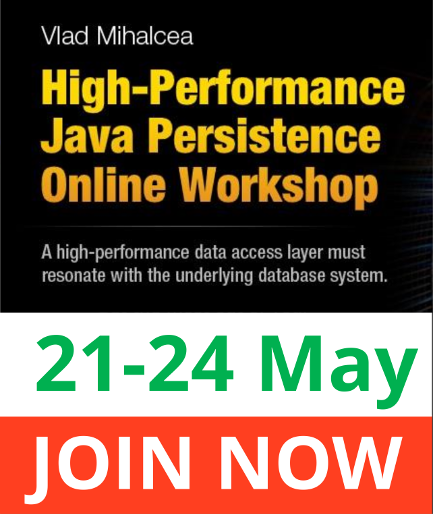How to map JSON objects using generic Hibernate Types
Imagine having a tool that can automatically detect JPA and Hibernate performance issues. Wouldn’t that be just awesome?
Well, Hypersistence Optimizer is that tool! And it works with Spring Boot, Spring Framework, Jakarta EE, Java EE, Quarkus, or Play Framework.
So, enjoy spending your time on the things you love rather than fixing performance issues in your production system on a Saturday night!
Introduction
In this article, we are going to see how you can map a JSON column to a JPA entity attribute using the Hypersistence Utils open-source project.
While you can create your own custom Hibernate Types, for mapping JSON column types on Oracle, SQL Server, PostgreSQL, or MySQL, you don’t need to implement your own Hibernate Type since the Hypersistence Utils project already offers this functionality.
The Domain Model
Assuming we have the following Domain Model:
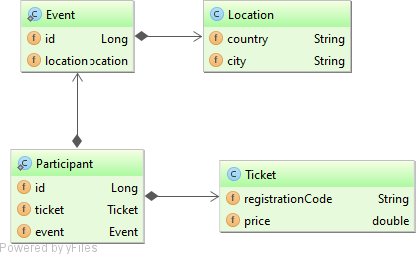
Location and Ticket are JSON Object(s), while Event and Participant are JPA entities. Our goal is to provide a Hibernate JSON Type that works for any type of JSON Java Object and on any relational database that supports JSON columns.
Maven dependency
The first thing you need to do is to set up the following Maven dependency in your project pom.xml configuration file:
<dependency>
<groupId>io.hypersistence</groupId>
<artifactId>hypersistence-utils-hibernate-55</artifactId>
version>${hypersistence-utils.version}</version>
</dependency>
Declaring the Hypersistence Utils
For Hibernate 6, you can use the @Type annotation when mapping an entity attribute on a JSON column:
@Type(JsonType.class) private Map<String, String> properties = new HashMap<>();
For Hibernate 5, you can use the @TypeDef annotation to make use of the JSON Hibernate Types:
@TypeDef(name = "json", typeClass = JsonType.class)
@MappedSuperclass
public class BaseEntity {
//Code omitted for brevity
}
The
@TypeDefannotations can be applied to a base entity class or in thepackage-info.javafile associated with your current entity’s package.
MySQL
MySQL 5.7 added support for JSON types, which, at the JDBC level, need to be materialized as String. However, the JsonType is smart knows how to handle each DB, so there’s nothing to worry about.
The entity mapping looks like this:
@Entity(name = "Event")
@Table(name = "event")
public class Event extends BaseEntity {
@Type(type = "json")
@Column(columnDefinition = "json")
private Location location;
public Location getLocation() {
return location;
}
public void setLocation(Location location) {
this.location = location;
}
}
@Entity(name = "Participant")
@Table(name = "participant")
public class Participant extends BaseEntity {
@Type(type = "json")
@Column(columnDefinition = "json")
private Ticket ticket;
@ManyToOne
private Event event;
public Ticket getTicket() {
return ticket;
}
public void setTicket(Ticket ticket) {
this.ticket = ticket;
}
public Event getEvent() {
return event;
}
public void setEvent(Event event) {
this.event = event;
}
}
When inserting the following entities:
final AtomicReference<Event> eventHolder = new AtomicReference<>();
final AtomicReference<Participant> participantHolder = new AtomicReference<>();
doInJPA(entityManager -> {
Event nullEvent = new Event();
nullEvent.setId(0L);
entityManager.persist(nullEvent);
Location location = new Location();
location.setCountry("Romania");
location.setCity("Cluj-Napoca");
Event event = new Event();
event.setId(1L);
event.setLocation(location);
entityManager.persist(event);
Ticket ticket = new Ticket();
ticket.setPrice(12.34d);
ticket.setRegistrationCode("ABC123");
Participant participant = new Participant();
participant.setId(1L);
participant.setTicket(ticket);
participant.setEvent(event);
entityManager.persist(participant);
eventHolder.set(event);
participantHolder.set(participant);
});
Hibernate generates the following statements:
INSERT INTO event (location, id)
VALUES (NULL(OTHER), 0)
INSERT INTO event (location, id)
VALUES ('{"country":"Romania","city":"Cluj-Napoca"}', 1)
INSERT INTO participant (event_id, ticket, id)
VALUES (1, {"registrationCode":"ABC123","price":12.34}, 1)
The JSON Object(s) are properly materialized into their associated database columns.
Not only that JSON Object(s) are properly transformed from their database representation:
Event event = entityManager.find(Event.class, eventHolder.get().getId());
assertEquals("Cluj-Napoca", event.getLocation().getCity());
Participant participant = entityManager.find(
Participant.class,
participantHolder.get().getId()
);
assertEquals("ABC123", participant.getTicket().getRegistrationCode());
But we can even issue native JSON-based SQL queries:
List<String> participants = entityManager.createNativeQuery("""
SELECT p.ticket -> \"$.registrationCode\"
FROM participant p
WHERE JSON_EXTRACT(p.ticket, \"$.price\") > 1
""")
.getResultList();
And JSON Object(s) can be modified:
event.getLocation().setCity("Constanța");
entityManager.flush();
Hibernate generating the proper UPDATE statement:
UPDATE event
SET location = '{"country":"Romania","city":"Constanța"}'
WHERE id = 1
PostgreSQL
PostgreSQL has been supporting JSON types since version 9.2. There are two types that can be used:
jsonjsonb
Both PostgreSQL JSON types need to be materialized using a binary data format, but the generic JsonType can handle this just fine.
PostgreSQL JSON column type
For the JSON column type, the two JSON Object(s) mapping must be changed as follows:
@Type(type = "json") @Column(columnDefinition = "json") private Location location; @Type(type = "json") @Column(columnDefinition = "json") private Ticket ticket;
The insert works just the same, as well as the entity update, and we can even query the JSON column as follows:
List<String> participants = entityManager.createNativeQuery("""
SELECT p.ticket ->>'registrationCode'
FROM participant p
WHERE p.ticket ->> 'price' > '10'
""")
.getResultList();
PostgreSQL JSONB column type
For the JSONB column type, we only need to change the columnDefinition attribute since both the json and jsonb PostgreSQL column types are handled by the JsonType:
@Type(type = "json") @Column(columnDefinition = "jsonb") private Location location; @Type(type = "json") @Column(columnDefinition = "jsonb") private Ticket ticket;
The insert and the JSON Object update work the same, while the JSONB column type provides more advanced querying capabilities:
List<String> participants = entityManager.createNativeQuery("""
SELECT jsonb_pretty(p.ticket)
FROM participant p
WHERE p.ticket ->> 'price' > '10'
""")
.getResultList();
I'm running an online workshop on the 20-21 and 23-24 of November about High-Performance Java Persistence.
If you enjoyed this article, I bet you are going to love my Book and Video Courses as well.
Conclusion
The Hypersistence Utils support for JSON column mapping is very useful, and you can use it to map entity attributes that are either POJO, String, or even JsonNode.
The best thing about the Hypersistence Utils project is that it offers support for Oracle, SQL Server, PostgreSQL, or MySQL JSON column types.

